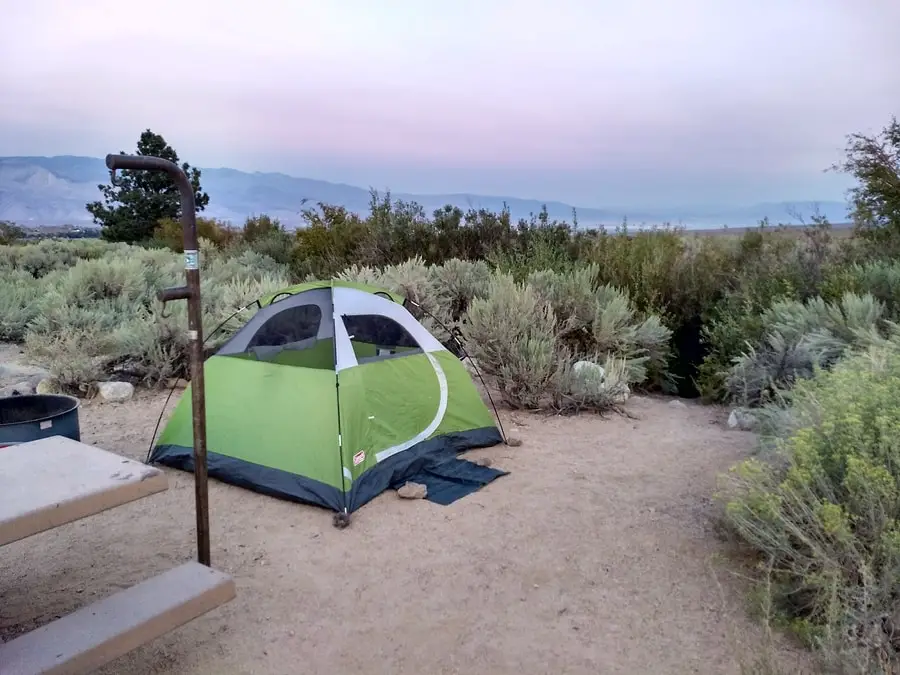
Camping is a very safe activity. Millions of people around the world partake in camping and other activities while camping in a safe manner. However, there are some risks that you need to be aware of.
So, what are the risks of camping? Here are 21 risks of camping you need to know about before you go:
- Car Accidents
- Fire Hazards
- Lightning
- Extreme Heat
- Extreme Cold
- Drowning
- Falling
- Rock Slides
- Quicksand
- Bears
- Mountain Lions
- Wolves/Coyotes
- Snakes
- Ticks
- Mosquitoes
- Plants
- Contaminated Water
- Food Poisoning
- Falling Trees
- Getting Lost
- Carbon Monoxide Poisoning
By the way, If you are in the market for a new tent, then you should click here to see the one I recommend on Amazon.
to see the one I recommend on Amazon.
Car Accidents
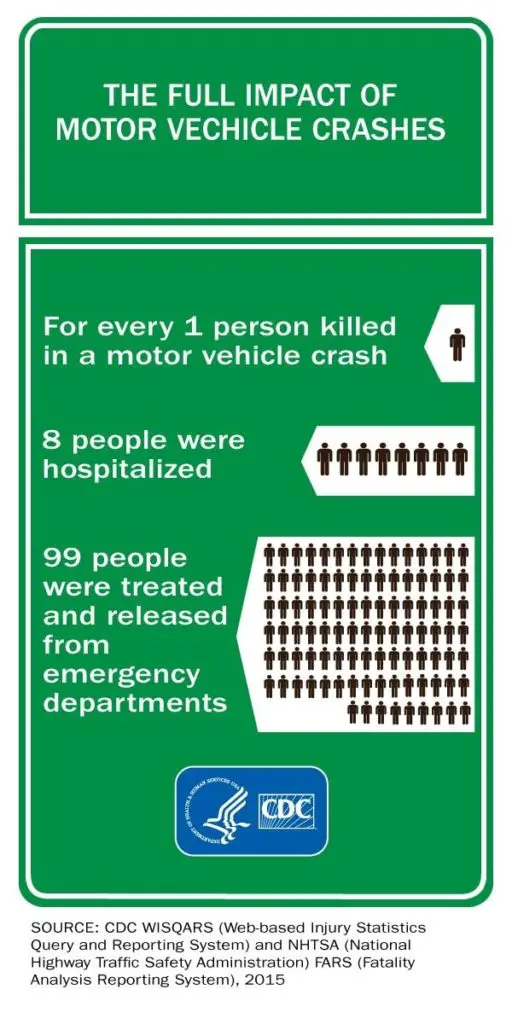
It’s sad to say that your drive to and from your camping destination is probably the most dangerous part of your camping trip. Not just because you are driving somewhere outside of civilization, but because driving is inherently dangerous. Driving claims the lives of more than 32,000 people and 2 million are injured each year from motor vehicle crashes in the U.S. alone according to the CDC.
Also, unfortunately, to say that a disproportionate amount of motor vehicle deaths occur in rural America. This shouldn’t dissuade you from going camping because driving is just a part of life for most of us in North America and many other countries. The only thing you can do and the best thing you can do is to practice safe driving habits to and from your camping destination.
Remember and follow the basics such as:
- Always wear a seatbelt
- Always obey posted speed limits
- Avoid becoming distracted
- Drive defensively
- Ensure you are well rested before driving
- Never drive intoxicated
- Ensure your vehicle is in good shape
- Stay off of your phone when driving
- Just by following basic driving safety precautions you can make your trip to and from the campground much safer and minimize the biggest risk of camping.
Fire Hazards
Fire hazards are another risk of camping to be wary of. Most fire hazards you could potentially experience while camping is at the fault of humans, but not always. Fires started from rogue campfires are the biggest concern of fire hazards when you are camping. In order to prevent this, you must be careful with your campfire and those around you must do the same. Here are some basic safety measures you can take in order to prevent fire hazards from your campfire:
- Use a fire pit
- Keep your campfire small
- Don’t use a campfire in high winds
- Never leave a campfire unattended
- Always keep water handy for extinguishment
- Completely extinguish your campfire when not in use
Also, keep in mind while campfires probably pose the largest risk of fire hazards while camping, any open flame can cause a forest fire or a brush fire. Be aware of any open flame such as matches, lighters, BBQs, stoves, etc. If you want to know more about fire safety when tent camping then click here to check out another related article I wrote.
Lightning
Lightning is always a risk when you are outdoors. There is no safe place to be outside when lightning is nearby. Your number one priority when you are outdoors and see lightning nearby is to get inside of a building with modern plumbing and electrical wiring as soon as possible. The second-best action you could take is to go inside a fully enclosed vehicle. Once you are inside, you should wait at least 30 minutes until after the last lightning strike before proceeding outside again.
Tents are never safe to be inside during a lightning storm and can even pose a greater risk of being struck if they are isolated in an open field or meadow. Luckily, your chance of getting struck by lightning is very low and the number of deaths worldwide per year is also extremely low. “When thunder roars, go indoors” and if you want a ton of more information on lightning safety while camping then I highly recommend you read this article that I wrote that goes into complete detail on camping safety and lightning.
Extreme Heat
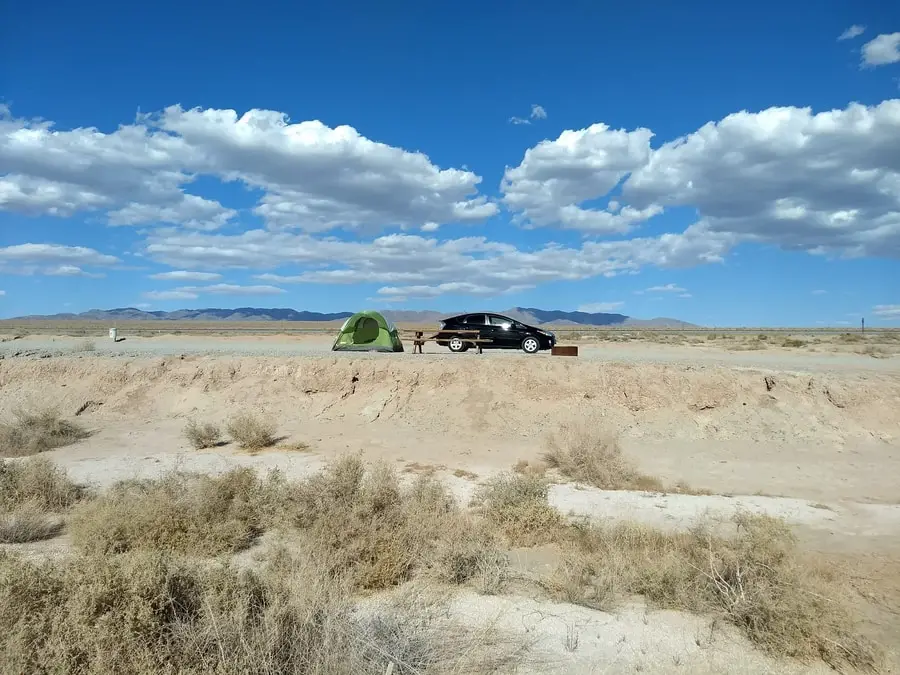
Summer is the most popular time to go camping. However, warmer temperatures can present dangers such as heat exhaustion, heatstroke, and other heart-related complications. Avoid excess activity during times of extreme heat and make it a priority to keep yourself cool while camping in warmer conditions. The same goes for any other outdoor activity when it’s hot out.
Extreme Cold
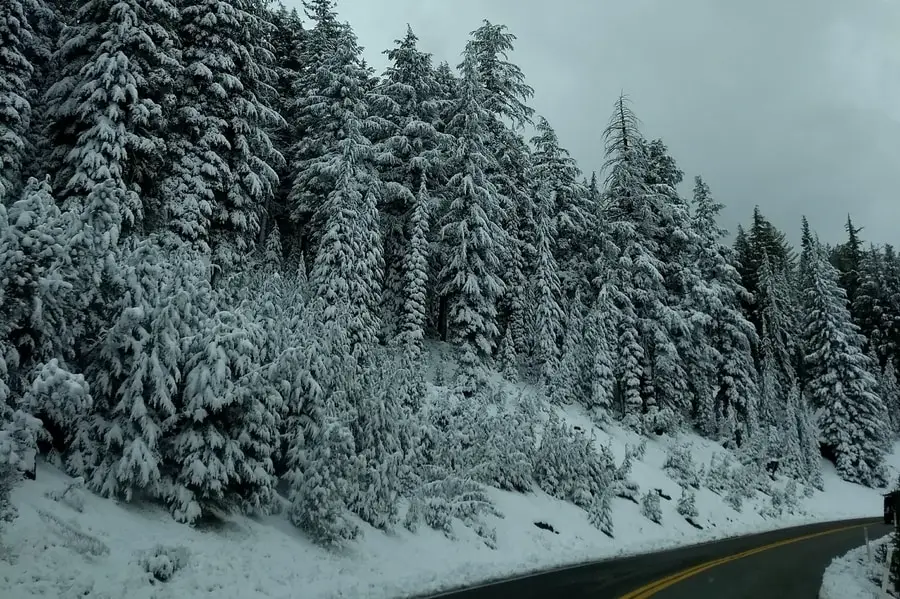
Winter camping can be an exciting and beautiful time to go camping, but cold temperatures present their own unique challenges. Hypothermia is real and more common than you might think. The best way to minimize the risks of extreme cold while camping is to be prepared for it and know your limits. Good gear goes a long way. A good sleeping bag, sleeping pad, sleeping bag liner, and clothing is essential for being comfortable in cold weather.
Drowning
A lot of the best places you can go camping includes bodies of water such as the ocean, rivers, lakes, etc. Wherever there is water, there is a potential for drowning. Make safe and smart decisions about entering water that you are unfamiliar with and know your limits and abilities to minimize this risk. The number one killer in National Recreation areas is, in fact, drowning (source).
Falling
Falls are always a concern when you are outdoors, particularly if you are hiking or exploring the natural environment. Staying on established trails, wearing appropriate shoes, and only taking on trails that are within your skill set are ways you can help minimize the risk of a serious fall. Exercise good judgment and pay attention to your surroundings when you are outdoors.
Rock Slides
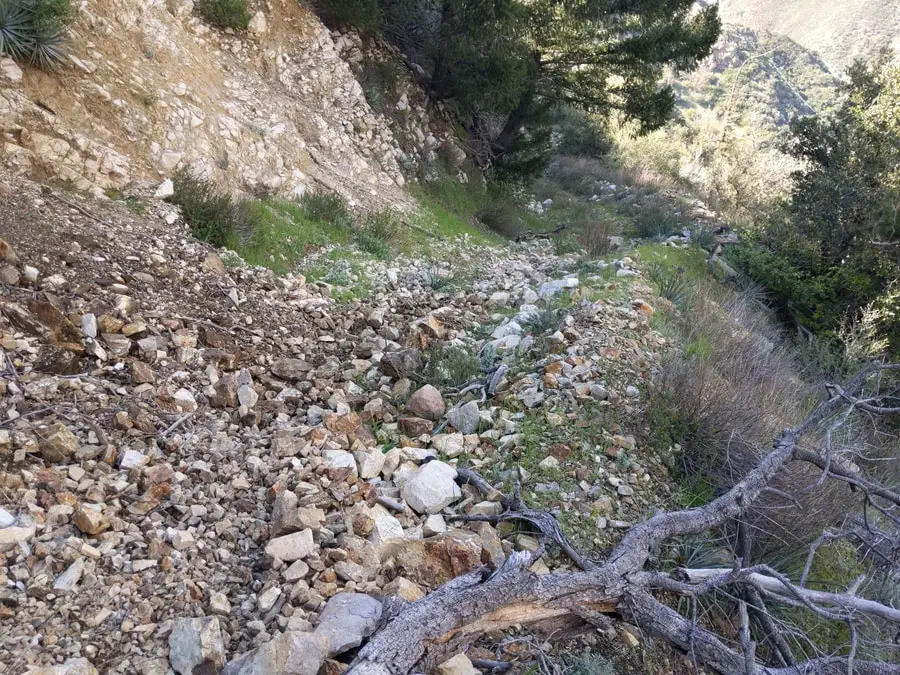
Rockslides can occur for many reasons including after heavy rain, heavy wind, from an animal, or from a person. Whatever the case it is best to move away from an at-risk area as soon as possible. Don’t set up camp under an area that is prone to have falling rocks.
Quicksand
Quicksand is real, although it usually is nothing like what you see in the movies. Quicksand can be found pretty much anywhere there is grainy soil and water. The fatality risk of quicksand is generally very low for humans because we are less dense than quicksand. You shouldn’t be able to sink further than your waist if you are relaxed.
Bears
Bears pose a much smaller risk to you while camping than you might think. Bears are found in most forested areas within the United States and North America and yet they are responsible for very little attacks and deaths each year. The CDC estimates that on average only 1 person is killed by bears per year in the United States. Bear safety is a huge amount of information but is generally involves around common sense of keeping your distance and properly storing your food.
Mountain Lions
Mountain lions are another animal you could come into contact with while camping that may pose a risk to your health. Their encounters with humans are actually pretty rare since they usually know that you are nearby before you do and they tent do avoid contact with humans.
A total of 125 attacks, 27 of which fatal, have been documented in North America in the past 100 years (source). if you do come in contact with a mountain lion, you should yell, throw rocks, try to make yourself bigger, and just annoy the animal until it retreats.
Wolves/Coyotes
Wolves and Coyotes are other animals that you could potentially come into contact with while camping. While they are two very different animals, they are both canines. The risk of injury while coming into contact with either of these animals is much less than that of being harmed by a domestic dog living in your neighborhood.
Snakes
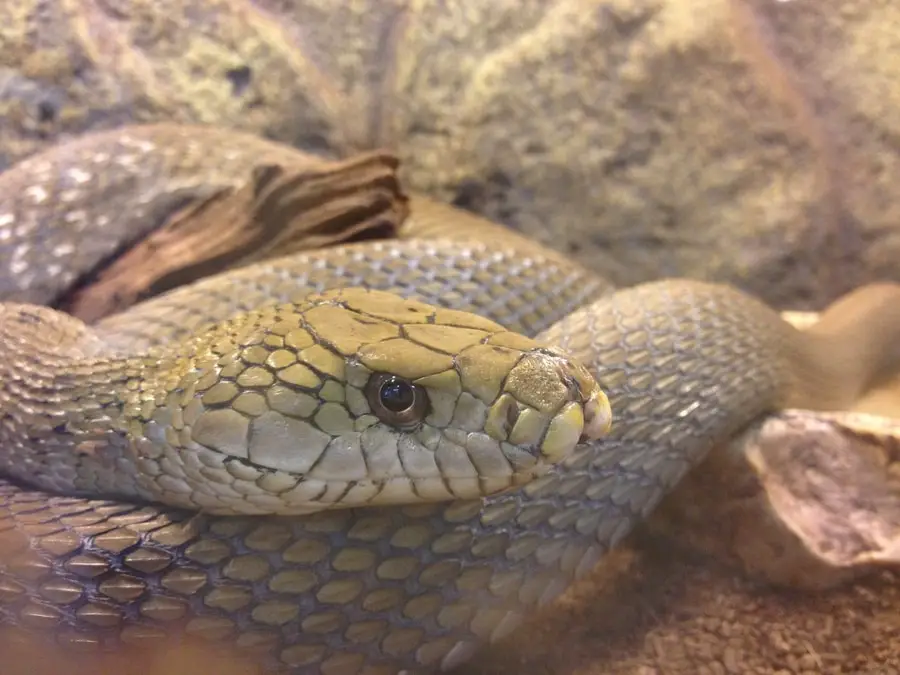
Snakes can be a very scary concern while you are camping. However, it might be a relief to know that most snakes do not seek out humans to purposely bite them. Most snakes will slither away long before you even see them. If you do come into contact with one then they will most likely slither away as well. Most snake bites occur from humans trying to interact with wild snakes. Some basic precautions you can take to avoid snakes while camping are:
- Stay out of high grass and brush where stakes might be
- Wear closed-toed shoes and full-length pants
- Be careful where you place your hands and feet around rocks, logs, and trees
- Keep your distance and never try to handle a wild snake
Ticks
Ticks are a concern while camping because they tend to live and thrive in areas where we like to go camping. You will likely find them in woody and grassy areas, so avoid walking through brush and tall grasses when you are camping. Ticks can carry diseases with them, so preventing their bites are important. The CDC provides guidance with some methods of preventing tick bites by:
- Staying on established trails and out of vegetation
- Using an EPA registered insect repellant
- Cover up with clothing as much as possible
- Treat clothing using permethrin
- Check for ticks daily and remove them as soon as possible
- Shower after being outdoors in tick areas as soon as possible
Mosquitoes
Believe it or not, mosquitoes are responsible for more deaths in the world per year than any other animal, including from humans. This is because mosquitos can carry infectious diseases with them and transfer diseases to people when they bite. A majority of deaths from mosquitos happens in countries outside of the U.S. and North America, but it is still a possibility.
The CDC notes that “In 2018, the number of severe cases of West Nile virus was nearly 25% higher in the Continental U.S. than the average incidence from 2008 to 2017.” which is pretty scary. Mosquitos hold the title for “world’s deadliest animal” because many different diseases can be carried by them.
- The best thing you can do to avoid mosquito bites while camping are to:
- Use an EPA registered insect repellent
- Cover up with clothing using long sleeve shirts and pants
- Use a mosquito net to protect yourself
- Keep your tent closed when not actively entering and exiting
- If you want to learn more about keeping the bugs away while camping then check out this article that I wrote.
Plants
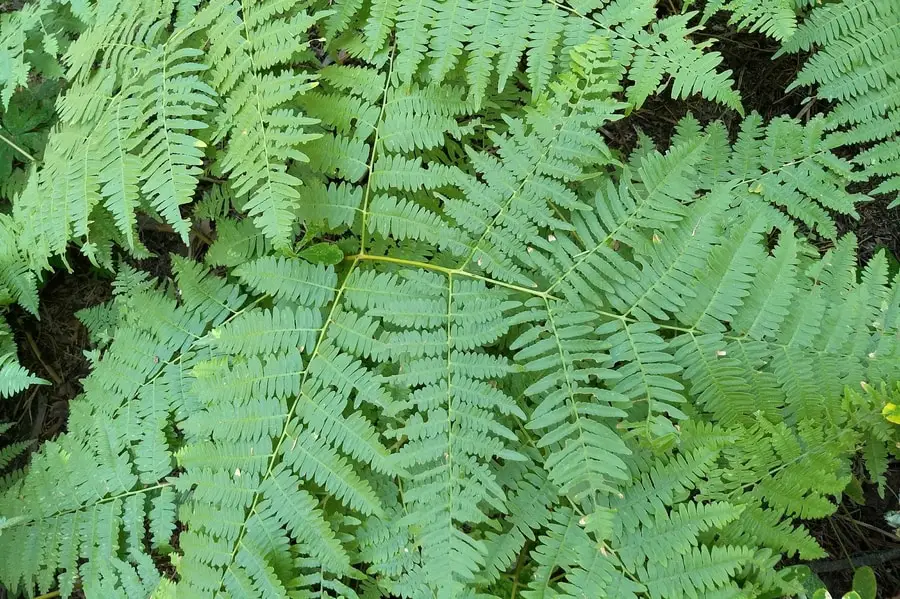
Some plants can be poisonous to humans if they are ingested. Some can cause rashes, infections, and stinging sensations if they come into contact with your skin. The same can be said for some of the fruits and berries that grow on some plants. The best general rule to follow when it comes to avoiding dangerous plants while camping and hiking is to just avoid them completely if you are not 100% certain that you can identify a plant as safe. Try to avoid going off-trail and avoid contact with all plants whenever possible.
Contaminated Water
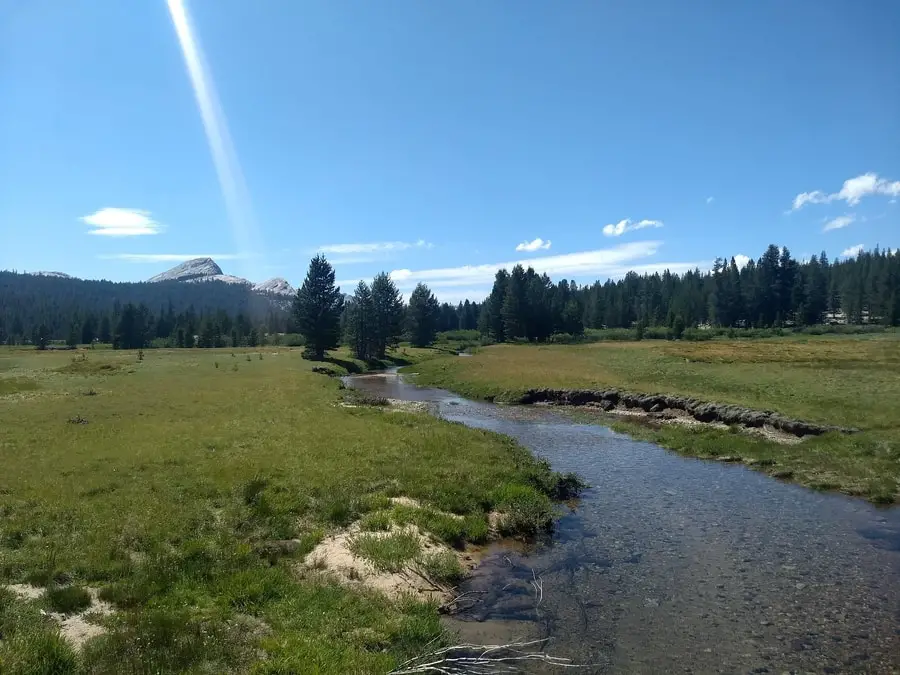
The best rule to follow when it comes to water in the wilderness is to assume that there is no safe drinking water naturally-occurring anymore. Always treat the water you find in natural sources such as lakes, streams, rivers, etc. while camping. Boiling water is often the most effective and easy way to treat water for drinking. You can read this article I wrote that has 13 ideas for boiling water safely.
The Centers for Disease and Control Prevention (CDC) recommends that you bring water to a rolling boil for at least one minute. If you are at an elevation above 6,500 feet then you should bring clear water to a rolling boil for at least three minutes. There are other ways to treat water such as with chemicals, but boiling water is probably the easiest and most accessible.
Alternatively, you could bring all of your drinking water from home with you so that you know the water is safe to drink. In that case, you are going to need some large water storage containers. I discuss how you can bring all of your drinking water camping with you in this article and I give recommendations for the water containers that I use.
Food Poisoning
Foodborne illnesses can happen anywhere and camping is no different. In order to prevent it, you need to make sure that your food is kept safe while camping. Here are some basic precautions to take in order to prevent food poisoning while camping:
- Ensure food stays cool in your ice chest
- Store food in tightly secured containers
- Keep your hands clean when preparing food
- Don’t let raw food items mix
- Clean surfaces where food is prepared thoroughly
- Cook food thoroughly
Falling Trees
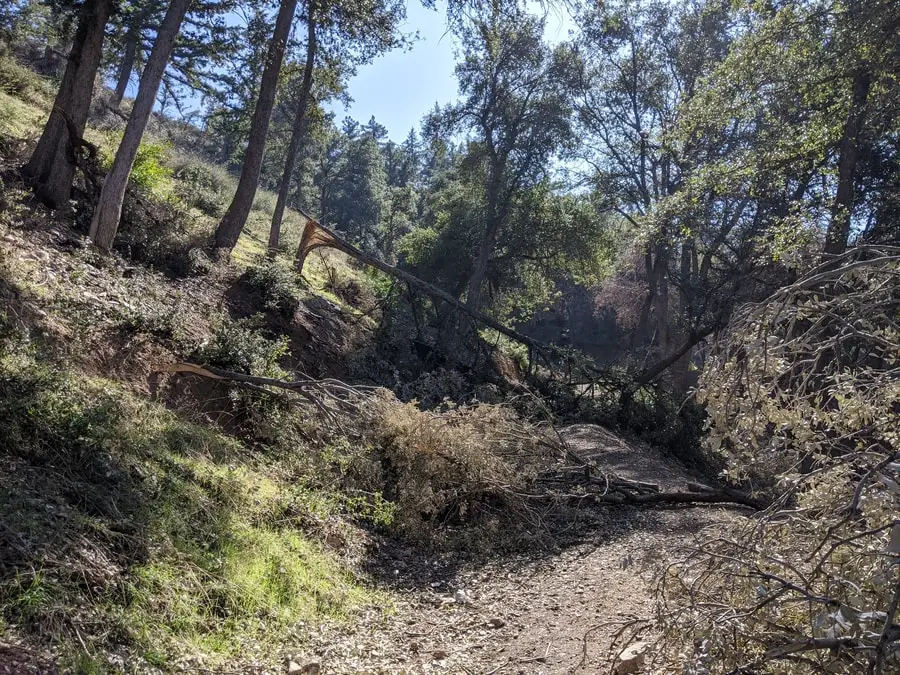
If a tree falls in the woods and no one is around to hear it, does it make a sound? I would think so. If a tree falls in the woods and you are around to hear it then that can be pretty scary. The likelihood of a tree falling on you is again very small, but exercising some basic precautions is also a good idea:
- Keep away from dead or burned trees that are more likely to fall
- Avoid heavily forested areas in heavy winds
- Stay away from leaning trees or those with heavy branches
- Heavy snow could increase the chance of branches or trees falling over
- Recognize the difference between healthy trees and unhealthy trees
Getting Lost
Getting lost sounds very scary and it is a very real possibility while camping and doing other related activities. Prevention is the best way to avoid getting lost but knowing how to get “un-lost” is also important. In order to avoid getting lost you should follow common guidelines such as:
- When hiking, always stay on the trail
- Avoid venturing out or staying out after dark
- Take a map and compass with you
- When hiking, carry an emergency whistle (link to an article about why I recommend a whistle)
- Don’t do anything far beyond your level of experience
- Try to get to know an area online before you go in person
- Tell someone where you are going before you go
If you do feel lost then here are some basic actions you should take:
- Never panic, instead, stay calm and think things through
- Blow your safety whistle with the international SOS signal
- If you are really lost then stay put and wait to be rescued
- Focus on meeting basic needs such as shelter, water, and food
- When going camping in a campground or on a well-established hiking trail, your chances of getting lost should be pretty slim.
Carbon Monoxide Poisoning
Carbon monoxide is known as the silent killer because the release of the gas is colorless, odorless, and tasteless. It is essentially impossible to detect without a carbon dioxide detector. In order to protect yourself from carbon monoxide while camping you need to ensure that you do not use any camping stoves or heaters inside of a closed area.
Common camping gases such as natural gas and propane emit carbon dioxide when they are burned and many camping equipment items rely on them such as stoves, heaters, grills, lanterns, etc. The key is to not burn any of these gases in an enclosed place such as in your tent, car, RV, etc. The carbon monoxide needs to be able to escape in the open air.
High altitudes can increase the risk of carbon monoxide, so this combined with an enclosed area can equal disaster. Carbon Monoxide poisoning can lead to symptoms such as dizziness, headaches, weakness, and confusion. If you recognize any of these symptoms associated with the use of your camping equipment while burning fuels then immediately turn off the appliances, seek fresh air and ventilation and see a medical professional. To recap on some safety precautions to prevent carbon monoxide poisoning:
- Never use gas camping stoves, lanterns, etc. in an enclosed area such as your tent, car, or RV.
- Recognize the symptoms and act immediately
- Consider getting a carbon monoxide detecter for your RV
- Know that higher altitudes pose a higher risk
- Children, the elderly, those with pre-existing conditions are at more risk
Conclusion
Of course, this list isn’t all-inclusive. The risks of camping may extend further than beyond this list depending on what kind of activities you partake in, where you go camping, etc. This list is not meant to scare anyone away from camping. Camping is a very safe activity to do. In fact, I wrote a very in-depth article on how camping is safe (link to read my article). Don’t let these minor risks keep you from camping, exercise common sense and you will have a lot of fun and be very safe while doing so.
Related Questions:
Can you get sick from camping?
You could potentially get sick from camping just as you can potentially get sick pretty much anywhere. Practice good hygiene while camping, stay a proper distance from someone else that is sick, and make sure your food and water are safe to consume and you will help minimize your risk of getting sick while camping.
Is wild camping dangerous?
Wild camping is most often a lot safer than walking around at night in most large cities. Wild camping is not inherently dangerous if you take the proper precautions and use common safety techniques.
My Favorite Camping Gear
- Air Mattress: click here
 to check out my favorite on Amazon.
to check out my favorite on Amazon. - Tent: click here
 to see my favorite tent available on Amazon.
to see my favorite tent available on Amazon. - Sleeping Pad: click here
 to check out the one I love on Amazon.
to check out the one I love on Amazon. - Sleeping Bag: click here
 to see the one I recommend on Amazon.
to see the one I recommend on Amazon. - Camping Stove: click here
 to see the best camping stove on Amazon.
to see the best camping stove on Amazon.


